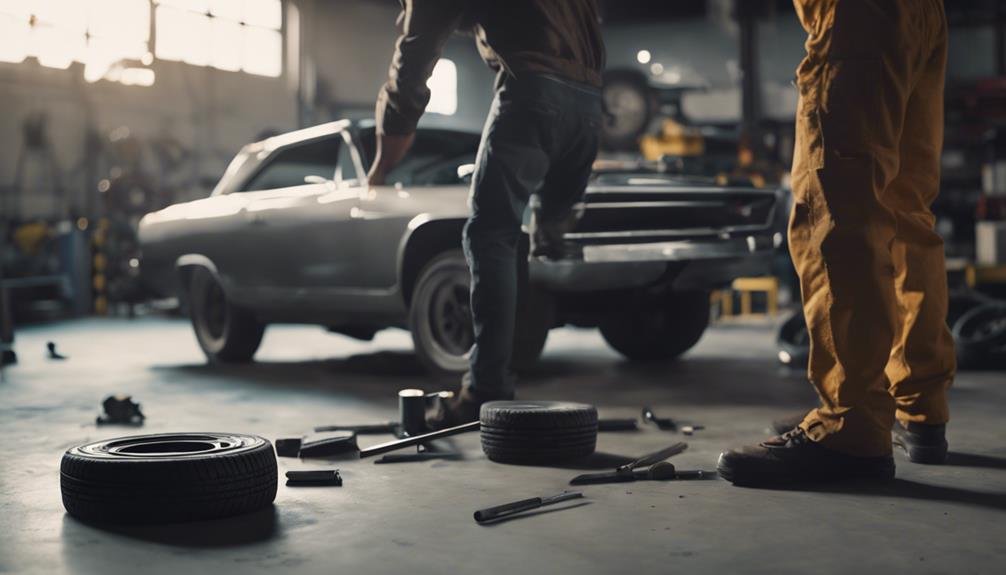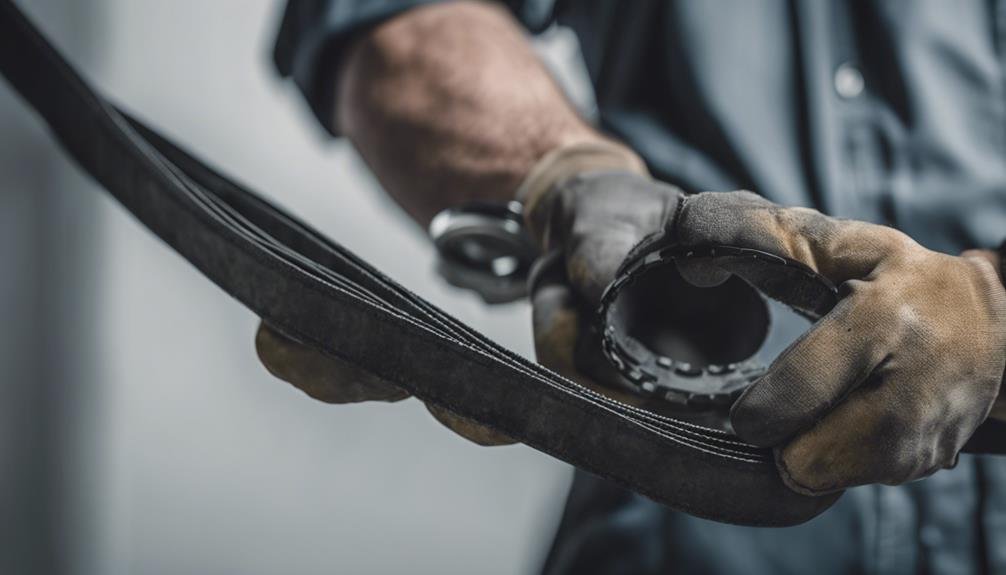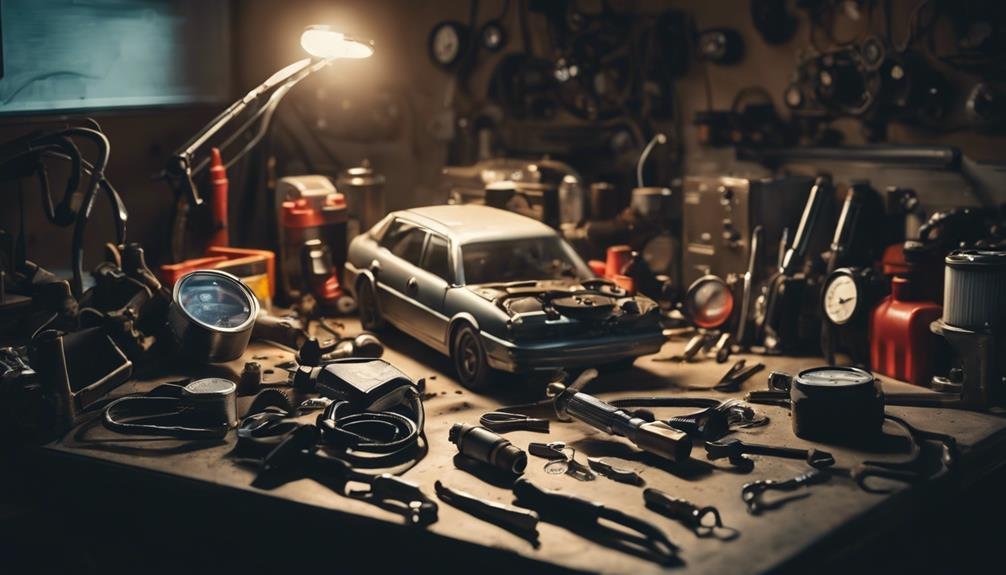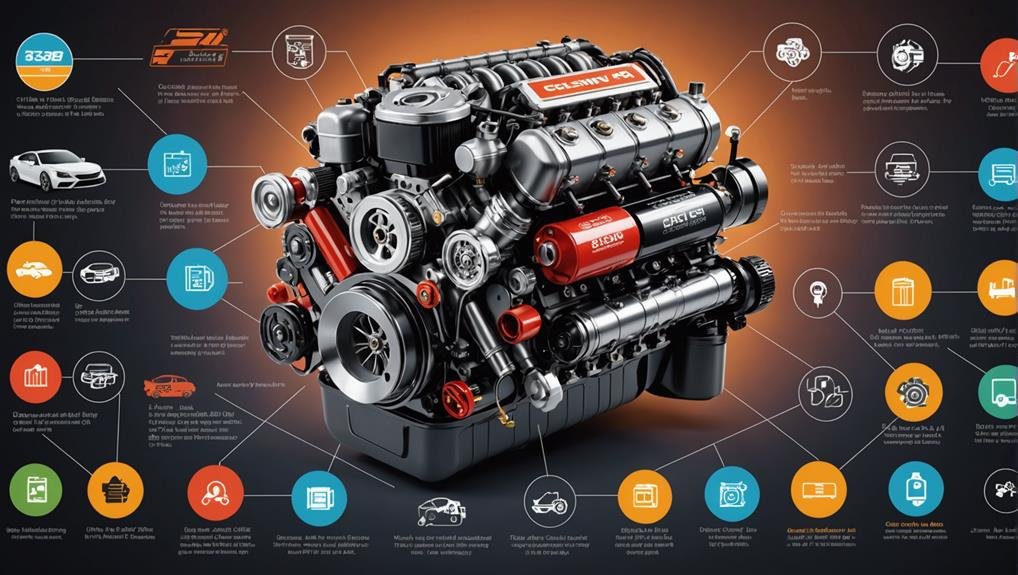When your vehicle reaches 100,000 miles, a thorough tune-up is important. This service typically includes necessary maintenance tasks, such as an oil and filter change, battery inspection and maintenance, tire rotation and balance check, and air filter replacement and cleaning. Moreover, it covers belt and hose condition inspections, fluid top-offs and leak checks, and transmission servicing and flush. Brake pad and rotor inspections are also performed, along with checks on the exhaust system, drive belts, brake lines, and fluid levels. By addressing these critical areas, you'll guarantee your vehicle runs efficiently, safely, and reliably – and there's more to discover in this detailed process.
Key Takeaways
- A 100K tune-up includes an essential oil and filter change to ensure proper lubrication and protection of engine components.
- Battery inspection and maintenance are crucial to prevent unexpected breakdowns and ensure reliable starts.
- Tire rotation and balance check are necessary for even tread wear, improved fuel efficiency, and enhanced safety.
- Air filter replacement and cleaning are vital for maintaining excellent airflow, engine performance, and fuel efficiency.
- Additional component inspections, including exhaust system, drive belts, brake lines, and fluid levels, help prevent costly repairs.
Essential Oil and Filter Change
During a 100K tune-up, one of the most important components is an oil and filter change, which helps maintain your engine's general health and performance by guaranteeing proper lubrication and protection against wear and tear.
When you neglect regular oil changes, your engine's performance suffers, leading to reduced fuel efficiency, increased engine temperature, and potential engine failure.
Fresh engine oil is necessary for proper engine lubrication, reducing friction, heat, and wear on engine components, which prolongs their lifespan. A clean oil filter traps contaminants and debris, preventing them from circulating in the engine and causing damage.
To maintain proper engine performance, it's essential to change your oil every 5,000 miles or as recommended by the manufacturer. By doing so, you'll ensure your engine runs smoothly, efficiently, and reliably.
Battery Inspection and Maintenance
As you reach the 100K milestone, a thorough battery inspection and maintenance are crucial to guarantee your vehicle starts reliably and efficiently. A battery inspection at this stage ensures proper voltage levels for starting the engine, preventing unexpected breakdowns.
| Task | Purpose | Benefits |
|---|---|---|
| Testing capacity | Identify battery health | Prevents unexpected breakdowns due to battery failure |
| Cleaning terminals | Ensure stable electrical performance | Prevents electrical issues in the future |
| Checking corrosion | Identify potential electrical issues | Prevents electrical issues in the future |
| Replacing worn-out battery | Prevent starting problems | Ensures reliable engine starts |
Tire Rotation and Balance Check

You should rotate your tires every 5,000 to 7,000 miles to guarantee even tread wear and prolong their life, and balancing them during rotation is important for a smoother, safer ride. Tire rotation and balance checks are vital components of regular vehicle maintenance, ensuring your vehicle remains stable and responsive.
By rotating your tires, you'll prevent uneven tread wear, which can lead to reduced fuel efficiency, compromised handling, and premature tire replacement.
Here are three key benefits of regular tire rotation and balance checks:
- Improved fuel efficiency: Properly balanced tires reduce rolling resistance, resulting in better gas mileage.
- Enhanced safety: Even tread wear and balanced tires improve traction, reducing the risk of skidding and loss of control.
- Prolonged tire life: Regular rotation and balancing prevent uneven wear, extending the life of your tires and saving you money in the long run.
Air Filter Replacement and Cleaning
Swapping out your air filter at the 100,000-mile mark is vital to guarantee your engine runs smoothly, efficiently, and with peak performance. Replacing the air filter is a critical component of a 100K tune-up, as a dirty filter can greatly impact engine performance, fuel efficiency, and the general health of the engine.
A clogged air filter restricts airflow, reducing horsepower, and increasing emissions, which can lead to premature engine wear and potential damage. On the other hand, a clean air filter ensures excellent airflow, allowing your engine to breathe easily, and operate at its best.
By replacing your air filter, you'll enjoy improved fuel efficiency, improved engine performance, and a longer engine lifespan. Regular air filter maintenance is essential, especially at the 100,000-mile mark, to ensure your engine continues to run smoothly, efficiently, and with peak performance.
As part of your 100K tune-up, your mechanic will inspect, clean, or replace your air filter, giving you peace of mind and a healthier engine.
Belt and Hose Condition Inspection

Now that your air filter is clean and ready to go, it's time to shift attention to the belts and hoses that keep your engine's essential systems functioning properly. During a 100K tune-up, your mechanic will inspect the condition of your belts and hoses to prevent potential breakdowns and costly repairs.
Here are three key components of the belt and hose condition inspection:
- Timing Belt Inspection: Your mechanic will check the timing belt for wear and tear, as it plays an essential role in engine operation.
- Serpentine Belts Check: The serpentine belts will be inspected for cracks, fraying, or signs of damage that could lead to system failures.
- Hoses Condition Verification: The hoses will be verified for leaks, cracks, or bulges that could lead to coolant or fluid leaks, causing engine overheating.
Regular inspection of belts and hoses at the 100K tune-up ensures efficient engine performance and longevity. Replacing worn belts and hoses can prevent engine overheating, system failures, and costly repairs.
Fluid Top-Offs and Leak Checks
How do important fluid levels and a leak-free system impact your vehicle's performance and longevity?
As part of your 100K tune-up, fluid top-offs and leak checks are vital to make sure your vehicle runs smoothly and efficiently.
During the tune-up, technicians will top off important fluids like engine oil, coolant, brake fluid, and power steering fluid to maintain ideal levels. This helps prevent engine overheating, component damage, and potential breakdowns on the road.
Leak checks are also conducted to identify and fix any leaks from the engine, transmission, cooling system, or other critical components. Identifying and fixing leaks during the tune-up prevents fluid loss, which can lead to serious mechanical issues if left unattended.
Regularly checking and maintaining fluid levels is an important aspect of a thorough 100K tune-up. By staying on top of your maintenance schedule, you can prevent costly repairs and ensure your vehicle runs at its best.
Transmission Servicing and Flush

During your 100K tune-up, technicians will give your transmission the care it needs to guarantee smooth shifting and prevent costly repairs down the line. Transmission servicing at this milestone is essential, as it involves changing the transmission fluid and inspecting for any signs of wear or damage. This process helps to remove contaminants and debris that can impact transmission performance.
Here are three key benefits of transmission servicing during your 100K tune-up:
- Extended transmission life: Regular transmission fluid changes and inspections can help prolong the life of your transmission system.
- Smooth shifting: Fresh transmission fluid and a clean transmission system ensure that your vehicle shifts gears smoothly and efficiently.
- Cost savings: Proper transmission maintenance at 100,000 miles can prevent costly repairs and transmission failure down the line.
Brake Pad and Rotor Inspection
When you hit 100,000 miles, it's vital to inspect your brake pads and rotors to make sure you can stop safely on the road. During a 100K tune-up, your brake pads will be examined for wear and thickness to guarantee peak braking performance. Technicians will also check the brake rotors for signs of damage, warping, or uneven wear that could impact braking efficiency. Proper maintenance of brake pads and rotors is essential for vehicle safety and preventing accidents on the road.
Addressing brake pad and rotor issues promptly can prevent more extensive and costly repairs down the line. Regular inspections of brake pads and rotors at the 100K tune-up help ensure smooth and effective braking operation. Moreover, your brake fluid will be checked to ensure it's at the recommended level, and your brake pads will be replaced if necessary.
It's recommended to have your brake pads inspected every 10,000 to 15,000 miles to prevent premature wear. By including brake pad and rotor inspection in your 100K tune-up, you can drive with confidence, knowing your vehicle can stop safely and efficiently.
Additional Component Inspections

Beyond brake pads and rotors, your vehicle's general health relies on the integrity of several other critical components, which is why a 100K tune-up includes a thorough inspection of supplementary parts. This detailed maintenance check guarantees your vehicle is running smoothly and safely.
Some key areas of focus during this inspection include:
- Exhaust system: Checked for leaks or damage to maintain proper exhaust gas flow and minimize harmful emissions.
- Drive belts: Inspected for wear, cracks, or damage to prevent breakage and costly repairs.
- Brake lines: Thoroughly examined for signs of wear, cracks, or corrosion to ensure excellent braking performance and safety.
Additionally, your mechanic will rotate your tires to encourage even wear and check air pressure for safe driving conditions. They'll also inspect boots, seals, and drive shafts, as well as ensure all fluid levels are adequate, including brake fluid, power steering fluid, and coolant.
Frequently Asked Questions
What Does a 100K Tune up Consist Of?
When you reach 100,000 miles, you're probably wondering what a 100K tune-up consists of. Well, it includes a thorough inspection of your timing belt, fluid checks and replacements, brake system inspection, and tire maintenance to keep your vehicle running smoothly and prevent costly repairs.
How Much Should a 100K Service Cost?
You're wondering how much a 100K service should cost. On average, expect to pay between $400 to $800, depending on your vehicle's make and model, with Toyota and Honda typically being more affordable than Ford.
What Fluids Should Be Changed at 100 000 Miles?
You should change transmission, brake, and power steering fluids at 100,000 miles to prevent wear and guarantee smooth operation, and don't forget to replace coolant fluid to prevent engine overheating and freezing.
What Is Included in the 100000 Mile Service?
When you reach 100,000 miles, you'll want to know what's included in this major service. Expect a thorough inspection of your vehicle's essential systems, including belts, fluids, brakes, and engine components, to guarantee your ride stays safe and runs smoothly.
Conclusion
You've just invested in a 100k tune-up, a thorough maintenance package that's vital for extending the life of your vehicle.
This detailed check-up covers everything from necessary oil and filter changes to transmission servicing and flushes, ensuring your car runs smoothly and efficiently.
By addressing potential issues before they become major problems, you'll avoid costly repairs down the road, saving you time, money, and stress in the long run.
